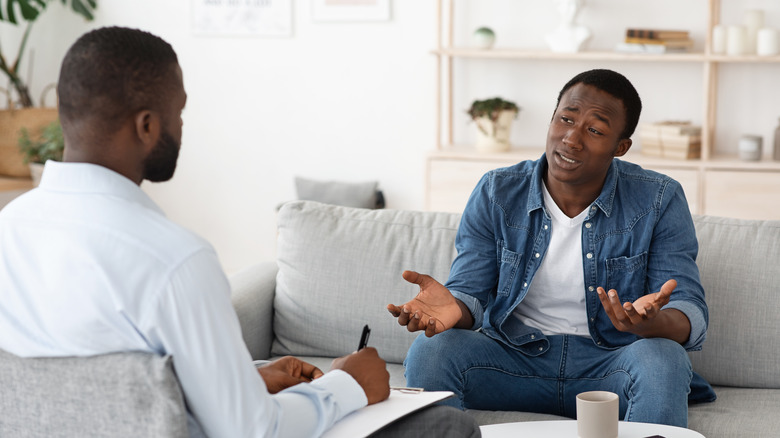Yes, You Really Can Go To Couples Counseling By Yourself
Attending couples therapy can often be a last resort measure to salvage a deteriorating relationship. The experience of visiting a counselor can be emotionally charged and harrowing, especially when honest assessments of one another's flaws and habits that have not been communicated suddenly come to the forefront. To avoid these confrontations, people may opt to attend couples therapy on their own and devise a strategy with their therapist on how to make a positive change within their relationship.
The desire to attend couples counseling by yourself – individual therapy for couple problems (ITCP), clinically speaking — can be triggered by a partner's refusal to participate in joint therapy or inability to consciously engage with the process. ITCP can also occur when someone decides to pursue treatment confidentially to protect themselves from undue influence or potential dissuasive tactics by their partner.
Before determining if attending couples therapy alone is the right choice for you, there are several potential benefits and drawbacks to consider.
Avoid relationship conflict by addressing your concerns alone
There are numerous reasons to try couples therapy without your partner. Going on your own is a way to address your individual concerns if your significant other has expressly refused to participate, for example. Conversely, even if you are attending couples therapy, you may wish to see an independent therapist if you don't feel you're progressing or if there are other issues you want to work on separately from your other half.
Practices that offer couples counseling for one, such as Couples Therapy Inc., explain that a benefit of solo therapy is enabling the individual to identify how they reinforce negative patterns of behavior without triggering potential conflict with their partner.
A benefit of the private setting also allows the client to work on their individual communication skills. The therapist can explore a person's unreleased trauma, which could be hindering their ability to express their feelings and needs with their significant other, or vice versa. In other words, attending couples therapy alone may provide an outlet for pent-up emotions, helping avoid unnecessary discord within the relationship.
Understand your therapist won't have the full picture
The main drawback of pursuing couples counseling alone is that this process could pull a fracturing relationship further apart. By only dealing with one partner, the therapist doesn't have an objective view of the whole relationship and, therefore, cannot necessarily judge what will work best for both parties.
Authors of a 2014 study published in the Journal of Marital and Family Therapy identified five areas of concern with ITCP. Researchers emphasized "the structural constraints on change; therapist side-taking and the therapeutic alliance; inaccurate assessments based on individual client reports; therapeutic focus; and ethical issues relevant to both attending and nonattending partners." This suggests that the lack of objectivity when a therapist can't hear from both partners poses a significant hurdle to potential progress.
Further, research shows that couples who see a single therapist separately or see different therapists experience higher divorce rates than those who attend shared counseling (via GoodTherapy). If you choose to go to couples counseling alone, make sure your goals are clear and the benefits outweigh the potential drawbacks for your specific situation.


